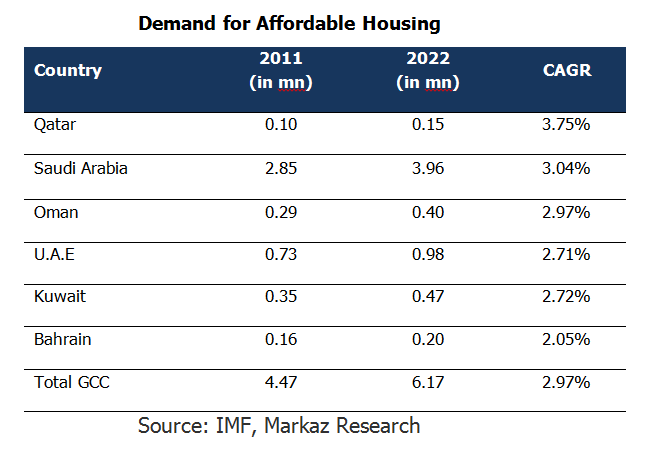_36.jpg)
The Kuwait Financial Center (“Markaz”) recently issued its report on the affordable housing sector in the Gulf Cooperation Council countries, in which it analyzed the conditions of this sector in the region in terms of demand stimulating factors, demand estimates in each of the member countries, main challenges, and supply-side obstacles. and recommended policies. The report also contains information about the various government initiatives being implemented in the region and trends in the sector over the coming period.
Markaz's report indicated that while the term "traditional housing" does not distinguish between income disparities, the definition of the term "affordable housing" is limited to housing that provides a reasonable level and location for low- and middle-income families, and whose cost is not too high. With it, the family can obtain its other basic needs in a sustainable manner. In other words, affordable housing is within the limits of the financial capabilities of families with a middle-income rate in any country. However, the demand for affordable housing in the Gulf countries is considered one of the main issues that have not yet received the attention it deserves from policy makers. There has become an urgent need to study the issue of the shortage of affordable housing in the Gulf region and the underlying factors in the system that lead to this chronic shortage.
The report estimates the population of the GCC region at a total of 49.3 million people as of 2013, and the region is expected to witness a population growth at a higher rate compared to developed and developing countries. This factor, in addition to the increasing size of the labor force in the region, leads to severe pressure to match the supply and demand for affordable housing in the GCC countries, which have become one of the most urbanized areas in the world, with more than 75% of their population residing in cities. Unemployment rates in the GCC countries are still high, reaching 15% of the total working-age population in Bahrain and the Sultanate of Oman, compared to 10.5% in Saudi Arabia. As for the GDP per capita in the Gulf countries, it is considered high and is similar to that of the developed countries, and better compared to emerging market economies such as China, India and Brazil. This high rate of GDP per capita in the GCC countries translates into a rise in the demand for housing in general, including affordable housing. The commitment of the Gulf states to diversify their economies to stimulate future growth in the region will increase the demand for low-cost housing as the lower income segments of the population become able to afford the cost of owning a home.
The demand for affordable housing is expected to be high in all member states of the Gulf Cooperation Council, as the total demand for affordable housing in Saudi Arabia is estimated at more than 3 million in 2014, about 82% of which are in urban areas. In Qatar, it is expected that the entire demand for affordable housing will be concentrated in urban areas.

The report pointed to the widening gap between supply and demand for affordable housing in the GCC countries, as the affordable housing sector in the Gulf region faces many challenges, including tightening conditions for granting credit facilities, fluctuations in building materials prices, and declining profit margins for real estate developers. Supply-side difficulties represented by the lack of housing finance, delayed approvals, inefficient urban planning system, prioritizing high-cost construction work (such as luxury villas and apartments), and long waiting lists for government housing programs are all adding to the pressure. To implement projects in this sector.
However, recent government initiatives are encouraging, as governments have begun to provide land in good locations at reasonable prices. Gulf governments also offer incentives to real estate developers and are working to form urban development authorities in the region, and in recent years there has been a higher degree of acceptance of public-private partnerships in the GCC due to the increasing capacity of the private sector to implement mega housing projects, but developers need to feel confident And reassurance about the possibility of obtaining stable liquidity when developing affordable housing schemes. Mergers and acquisitions of home developers will improve the profit margin in affordable housing projects, enabling developers to obtain liquidity more easily compared to most competitors around the world, thus enabling efficient and rapid execution of real estate development projects.
The issue of providing affordable housing in the GCC countries is important and essential and must be dealt with urgently, and an effective plan of action must be developed to focus on integrating the economic, social and cultural aspects, planning and actual development by adopting a national housing policy and strategy that takes into account the future population growth in major cities and encouragement Spread in other urban suburbs.
About Kuwait "Markaz" Financial Center
was established Kuwait Financial Center (KSC . P) "Center" in 1974 to become one of the prestigious financial institutions in the Arabian Gulf region in the areas of asset management and investment banking. The center now manages total assets of 1.12 billion Kuwaiti dinars as of September 30 , 2014 (US$3.89 billion). Markaz was listed on the Kuwait Stock Exchange in 1997 .
-End-
For more information, please contact:
Osama Al-Musallam,
Communications and Public Relations
Officer, Kuwait Financial Center K.P.S.C. (“The Centre”)
Tel: +965 2224 8000 Ext. 1819
Fax: +965 2241 4499
E-mail: [email protected]

